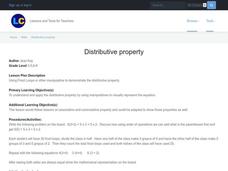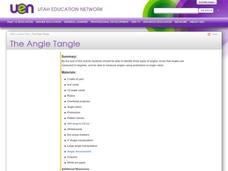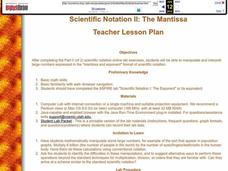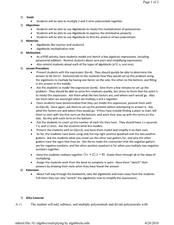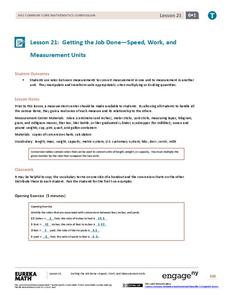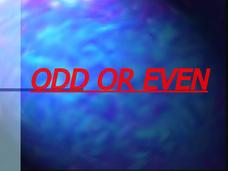Achieve
Corn and Oats
How much land does a parcel hold? How much fertilizer does it take for a field of corn? Pupils answer these questions and more as they apply ratio reasoning and unit analysis.
Curated OER
"Polly"gon Pockets
Explore polygons with your elementary learners. Divide the class in 12 to configure the polygon puzzle before them. They list the attributes of each type of polygon they see, and if there's time, they jump on the interactive website...
Curated OER
Distributive Property
Students explore the distributive property. In this algebra lesson plan, students are given Fruit Loops or other manipulatives and the class is divided in half. Each half of the class completes part of the equation to show that both...
Curated OER
Three Squirrels and a Pile of Nuts
Middle schoolers solve story problems using a spreadsheet in combination with various problem-solving strategies. Working in teams of three, students create attempt to solve a story problem using three different methods; using...
Curated OER
Fraction and Decimal Garden
Third graders write fractions and decimals using unifix cube models and grid paper. They draw a garden using grid paper and label each section with the correct fraction and decimal to the tenths. This is a clever way to use manipulatives...
Curated OER
What Makes Ten
Students investigate the concept of ten and how it is part of the real number system. They find the quantity of ten using as many combinations as possible. They can count using manipulatives, write on paper, or by doing mental math.
Curated OER
Who's In The Fact Family?
Learners study related addition and subtraction facts. In this math lesson, students use related addition and subtraction to solve problems. Learners use manipulatives to explore fact families.
Curated OER
Angles
Fourth and fifth graders investigate angles and name them according to the criteria for obtuse, acute, and right angles. They examine a human-made yarn pattern on the floor of their classroom and identify angles, vertices, and types of...
California Education Partners
Window Washers
Aim high with a task on window washers. An assessment task challenges learners to determine the number of windows two people wash. They do this using a given number of window rows on each side of a building. In addition, they find the...
Curated OER
Scientific Notation II: The Mantissa
Practice converting a conventional number into scientific notation, and vice-versa. Using an applet, they perform the operations of multiplication and division on numbers expressed in scientific notation.
Virginia Department of Education
Integers: Addition and Subtraction
Young mathematicians construct their own understanding of integers with an inquiry-based math lesson plan. Using colored chips to represent positive and negative numbers, children model a series of addition and subtraction problems as...
Curated OER
Students Multiply Polynomials
Factor polynomial functions that have two and three terms. Using Algeblocks, your class will create models to show their understanding of these concepts.
Achieve
BMI Calculations
Obesity is a worldwide concern. Using survey results, learners compare local BMI statistics to celebrity BMI statistics. Scholars create box plots of the data, make observations about the shape and spread of the data, and examine the...
Curated OER
Problem Solving Model
Use a vocabulary chart to introduce math functions. The class defines a list of mathematical vocabulary terms on a worksheet, as well as completes equations and expressions. They examine word problems and practice transcribing them into...
Curated OER
Understanding the 1855 Census Database
Use data from the 1855 New York census to better understand the Irish immigrant experience during the late 19th century. Young historians analyze information from the census and build three hypotheses regarding the residents of the Five...
PBS
Add, Subtract and Multiply Fractions
Your future chefs will appreciate this comprehensive lesson where learners practice operations on fractions using pizza and soup analogies. Learners begin with a pizza analogy that requires the learners to multiply a whole number by a...
EngageNY
The Definition of Sine, Cosine, and Tangent
Introduce your classes to a new world of mathematics. Pupils learn to call trigonometric ratios by their given names: sine, cosine, and tangent. They find ratios and use known ratios to discover missing sides of similar triangles.
Achieve
Dairy Barn
Agriculture is truly a math-based profession! Help the dairy farmer determine the supplies needed to complete his barn. Using given dimensions, learners build equations and use units to determine the correct amount of materials.
EngageNY
Getting the Job Done—Speed, Work, and Measurement Units
How do you convert from one measurement to another? Pupils use unit rates to convert measurements from one unit to another in the 21st segment in a 29-part series. They convert within the same system to solve length, capacity, weight,...
Beyond Benign
Puzzler
Are some packaging materials superior to others? Using sustainability as a guide, scholars analyze different packing materials to describe their life cycles. They create puzzles to communicate their findings.
Curated OER
Tens and Ones Fun
Youngsters use their large motor skills to build numbers to 20 in this outdoor, kinesthetic, collaborative activity. Amass cardboard boxes for groups to stack, sort, and bundle into 10s and 1s to show numbers and place value. They'll...
Curated OER
Odd or Even
A great way to show the difference between odd and even numbers is by using blocks. The graphics in this PowerPoint do a great job at showing the two groups of numbers. Tip: After viewing this presentation, have students experiment with...
Curated OER
Divided We Stand
Students figure out how to arrange seating in a concert hall given specific requirements. They better explain how dividing can allow us to arrive at mathematical solutions quickly and logically.
Curated OER
Area, Perimeter, Circumference
Sixth graders use different measuring tools to measure area, perimeter, and circumference of different shapes. In this measurement lesson plan, 6th graders measure parallelograms, triangles, and circles.




